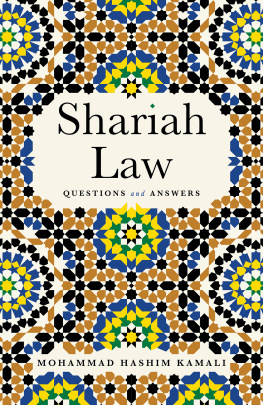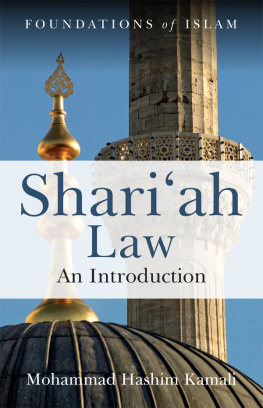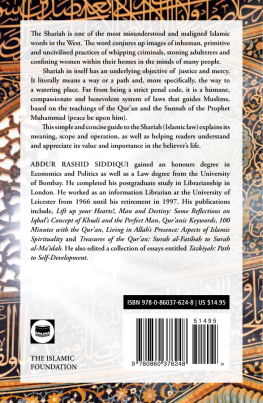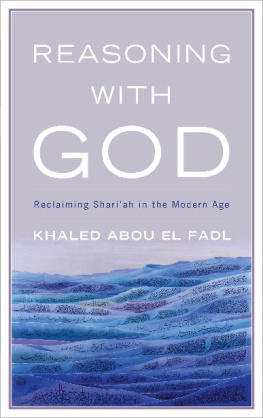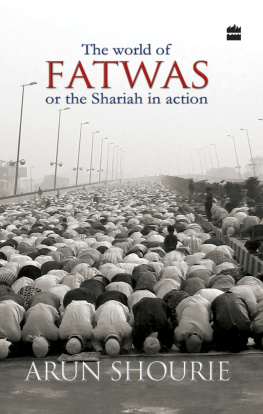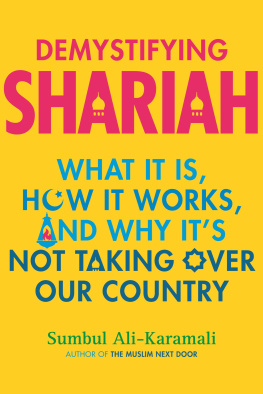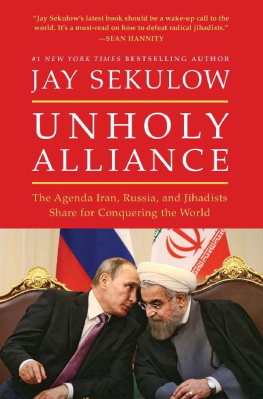Kamali - Shariah Law
Here you can read online Kamali - Shariah Law full text of the book (entire story) in english for free. Download pdf and epub, get meaning, cover and reviews about this ebook. year: 2017, publisher: Oneworld Publications, genre: Religion. Description of the work, (preface) as well as reviews are available. Best literature library LitArk.com created for fans of good reading and offers a wide selection of genres:
Romance novel
Science fiction
Adventure
Detective
Science
History
Home and family
Prose
Art
Politics
Computer
Non-fiction
Religion
Business
Children
Humor
Choose a favorite category and find really read worthwhile books. Enjoy immersion in the world of imagination, feel the emotions of the characters or learn something new for yourself, make an fascinating discovery.
- Book:Shariah Law
- Author:
- Publisher:Oneworld Publications
- Genre:
- Year:2017
- Rating:5 / 5
- Favourites:Add to favourites
- Your mark:
- 100
- 1
- 2
- 3
- 4
- 5
Shariah Law: summary, description and annotation
We offer to read an annotation, description, summary or preface (depends on what the author of the book "Shariah Law" wrote himself). If you haven't found the necessary information about the book — write in the comments, we will try to find it.
Shariah Law — read online for free the complete book (whole text) full work
Below is the text of the book, divided by pages. System saving the place of the last page read, allows you to conveniently read the book "Shariah Law" online for free, without having to search again every time where you left off. Put a bookmark, and you can go to the page where you finished reading at any time.
Font size:
Interval:
Bookmark:

FURTHER PRAISE FOR
SHARIAH LAW: QUESTIONS AND ANSWERS
A clear-eyed, scholarly, thorough and timely general treatment of the most pressing questions an English-speaking layman may have about the Shariah.
Professor Dr. HRH Prince Ghazi bin Muhammad bin Talal
A most appropriate book that provides a clear understanding of Shariah law, especially in these times of general misunderstanding about the system in the West. Highly recommended.
Mashood A. Baderin,
Professor of Laws, School of Law,
SOAS University of London
Mohammad Hashim Kamali is founding CEO of the International Institute of Advanced Islamic Studies (IAIS) at the International Islamic University, Malaysia. He lives in Kuala Lumpur.

S ince this book is largely based on my general knowledge of Shariah law that I have gained over the years, I owe a debt of gratitude to all those from whom I have learned it. I take this opportunity to thank them all, especially my late father, who was a Shariah scholar and judge and gave me an early grounding in the subject. I take this opportunity also to thank my teachers, students, colleagues and peers whose views and counsel have influenced my own views. In my more recent deliberations, I have learned from Tun Abdullah Ahmad Badawi, former Prime Minister of Malaysia and current Chairman of IAIS, with whom I have sat on numerous consultative sessions. I thank warmly Tun Abdul Hamid Mohamad, former Chief Justice of Malaysia, through many conversations and the exchange of letters we had over matters of mutual interest. I have enjoyed similar relationships with Dr Chandra Muzaffar and Tan Sri Jawhar Hassan, and I thank them both for their valuable views and advice on issues especially of concern to developments in Malaysia. Learned works of outstanding scholars I have consulted include those of Professors Seyyed Hossein Nasr, Mohamed Selim al-Awwa and John Esposito, all of whom I have personally known, but also the learned Sheikh Yusuf al-Qaradawi whose works I have admired and frequently quoted. I record my profound appreciation for their impressive contributions to the scholarship and the better understanding of Shariah.
Professor Muhammad Khalid Masud read an early version of this work and made many useful comments. I also thank most warmly Novin Doostdar of Oneworld Publications who was supportive not only in facilitating publication of this work, but also that of my previous title, Shariah Law: An Introduction , which I published with him back in 2008. He made useful suggestions on both occasions that facilitated the timely publication of these works.
I would also like to mention and thank warmly my friends and colleagues at the Institute here, especially Dr Mohamed Azam Mohamed Adil, for the many beneficial exchanges of views and conversations we had on matters of mutual interest. My colleague Mohd Fariz Zainal Abdullah was most helpful with filling gaps in my own knowledge and checking details, especially in the Arabic sources. Siti Mariyah Chu Abdullah has been closely involved in assisting me with manuscript preparation and computer work. Norliza Saleh was ever ready and courteous, helping me with data searches and computer work in Arabic.
Last but not least, I thank most warmly my wife Susannah for taking care of me and providing me with the space and peace of mind to spend so much time on writing.
Any shortcomings that remain are my own.
Mohammad Hashim Kamali
International Institute of Advanced Islamic Studies (IAIS), Malaysia
March 2017
T he question and answer style information on Shariah provided in this book is intended to inform the reader on the salient aspects of Shariah and its characteristic features, with some information on its sources, its rules and objectives and its internal resources for self-adjustment, without engaging in any detailed exploration of this inordinately rich field of Islamic discipline. The volume at hand is organised in seventeen sections consisting of a total of 190 questions and answers. Some sections are large but most are brief, often no more than a few pages or paragraphs. Some of the more extensive of these sections that occupy relatively larger spaces are the first two about the sources of Shariah, and legal opinion ( fatwa ), followed by the sections on marriage and family, Shariah and science issues, Shariah law and governance, and jihad, war and violence. This is due partly to the topicality of the subjects and the more extensive treatment they have received in both the classical fiqh and modern scholarship. The Shariah and science section is concerned mainly with Shariah responses on biotechnology and bioethics, raising issues, for instance, on genetic engineering on humans, or eugenics, human cloning, artificial insemination, surrogate motherhood, euthanasia and abortion. Issues of concern to animals and plants, food safety and genetically modified organisms have also been raised. The section on Shariah, Constitutional Law and Civil Liberties raises questions on Islam and democracy, separation of powers and the status of statutory legislation side by side with the Shariah. Other themes featuring in this section include caliphate and the Islamic state, fundamental rights and liberties, gender equality, and human rights. These last two are exceedingly wide-ranging in themselves but our treatment of them is limited to womens right to work outside the home, their entitlement to education and rights to choose their own marriage partners. We have also discussed issues of concern to gender segregation, women as witnesses and judges, domestic violence and female genital mutilation. Included in our selection of topical issues of concern to Shariah and human rights are also Shariah punishments, namely the hudud , which have given rise to questions by contemporary human rights activists. We raise issues and address them while taking into consideration the concerns both of Shariah scholars and those of the proponents of human rights. We have also taken the opportunity in this connection to advance reform proposals that arise from our previous research into the source evidence of Shariah on a number of issues, including the hudud . The reader will thus note that our selection of questions on Shariah and the responses they have received are on the whole issue-oriented, as opposed to descriptive expositions, as it were, of the Shariah and Islamic law perspectives. The responses we have presented also echo the concerns of a modern student and reader of Shariah.
The main purpose in all of this has been to provide an inkling for a general-interest reader and one who may be inclined to do further research and take these questions further. We look at the basic contours of Shariah, whether it has the resources to address contemporary issues, and the manner how it may relate to other legal traditions. The first chapter thus provides a comparative overview of the commonalities and differences of note between the Shariah, the common law and the civil law traditions.
As already noted, one of the reasons we have chosen a question and answer format for this book is simplicity and easy access, especially for the non-specialist. The present writer has previously published larger texts on Islamic law and jurisprudence and has found out through years of contact and feedback with his publishers in the UK and elsewhere that there is a demand for easier presentations of Shariah to the average reader of this discipline, especially in the West, and in the English language. My previous works, especially, Principles of Islamic Jurisprudence (1991, and 3rd revd edn 2003), and Shariah Law: An Introduction (2008) are textbooks on their subjects designed mainly for university students and readers. The second of these two books also has attempted to be less technical. This book follows that trend in a different way and seeks to reach the average educated reader at a time that misinformation on Shariah has proliferated in the mainstream media and amongst the general public. Unlike Orientalism which was confined mainly to academia, the current tide of Islamophobia and misinformation on Islam and the Shariah is more general. That said, the present book still seeks to be more than skin-deep and seeks to combine an academic flavour, as it were, to introduce the thoughtful reader, however lightly, into the characteristics of an exceedingly rich discipline. A yet additional reason for the selection of the present format is to afford an opportunity to engage in issues of contemporary and topical interest. This is not always possible in a textbook or monograph but only when one has the liberty to pose relevant questions of topical interest. We hope that this purpose has been achieved, or at least partially achieved, as unlike a textbook engagement in a measure of speculation is also inevitable in answering unprecedented questions.
Font size:
Interval:
Bookmark:
Similar books «Shariah Law»
Look at similar books to Shariah Law. We have selected literature similar in name and meaning in the hope of providing readers with more options to find new, interesting, not yet read works.
Discussion, reviews of the book Shariah Law and just readers' own opinions. Leave your comments, write what you think about the work, its meaning or the main characters. Specify what exactly you liked and what you didn't like, and why you think so.

